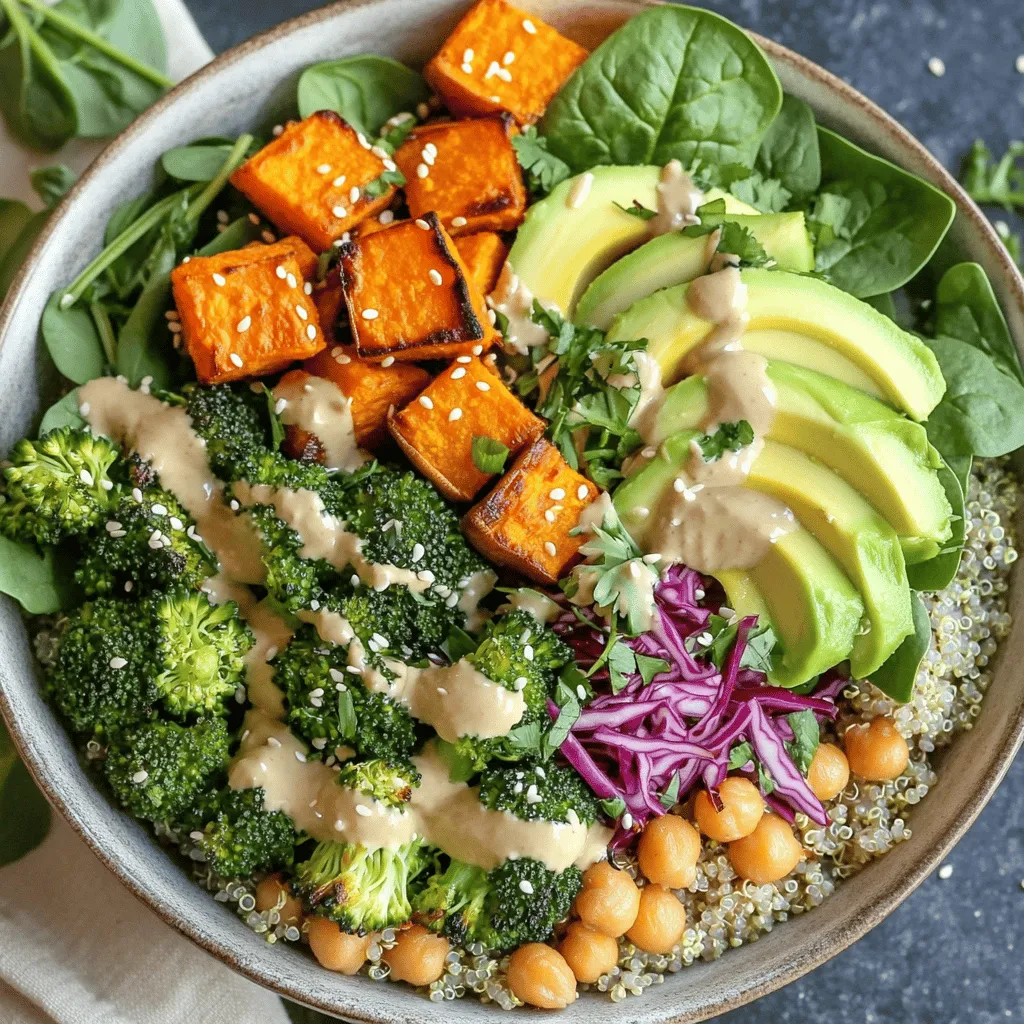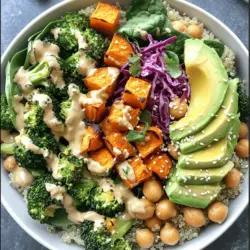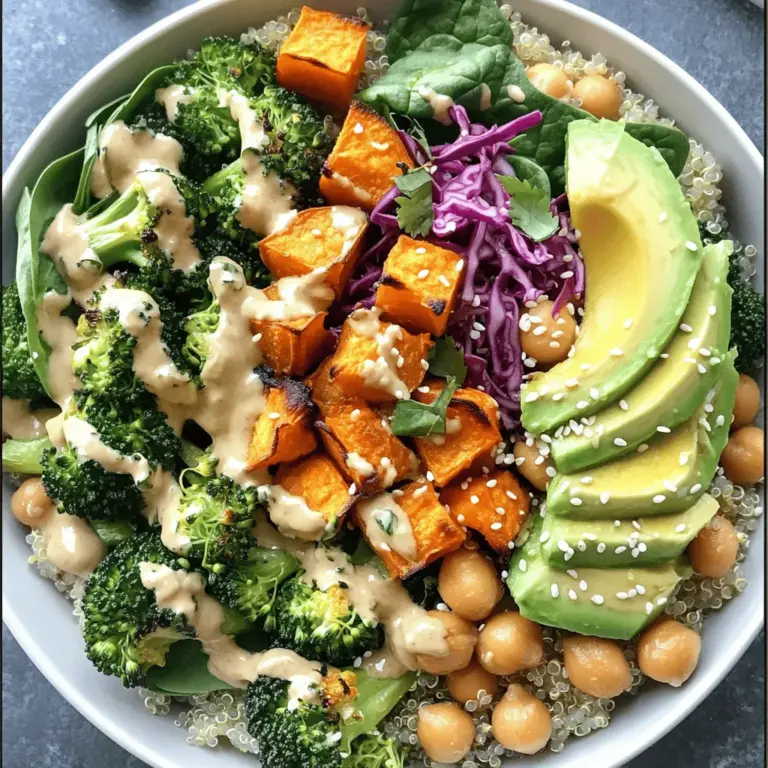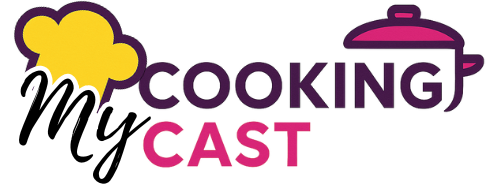Are you searching for a healthy, tasty meal that’s easy to make? Look no further! A Vegan Buddha Bowl offers a balanced mix of grains, veggies, and delicious dressing. In this post, I’ll guide you through the essential ingredients, step-by-step instructions, and tips to create your own Buddha Bowl. By the end, you’ll have a colorful, flavor-packed dish that’s perfect for any meal. Let’s dive in!
Ingredients
Essential Ingredients for Vegan Buddha Bowl
To make a tasty Vegan Buddha Bowl, gather these key ingredients:
– 1 cup quinoa, rinsed
– 2 cups water or vegetable broth
– 1 cup chickpeas, cooked or canned (drained and rinsed)
– 1 medium sweet potato, peeled and cubed
– 1 cup broccoli florets
– 1 cup spinach
– 1 avocado, sliced
– 1/4 cup red cabbage, shredded
– 2 tablespoons sesame seeds
– 2 tablespoons olive oil
– 1 tablespoon maple syrup
– 1 tablespoon tahini
– 1 tablespoon lemon juice
– Salt and pepper to taste
These ingredients create a balanced bowl that is both filling and vibrant.
Optional Add-ins for Extra Flavor
Want to spice things up? Here are some fun add-ins:
– Fresh herbs (like cilantro or parsley) for garnish
– Roasted nuts or seeds for crunch
– Sliced radishes for a peppery bite
– Diced bell peppers for sweetness
– A splash of hot sauce for heat
Feel free to mix and match these extras. They add layers of flavor and texture.
Nutritional Highlights
This Vegan Buddha Bowl is not just pretty; it’s nutritious too! Here are some highlights:
– Quinoa is a complete protein and full of fiber.
– Chickpeas add protein and help keep you full.
– Sweet potatoes are rich in vitamins A and C.
– Broccoli is a powerhouse of vitamins and minerals.
– Spinach offers iron and antioxidants.
– Avocado provides healthy fats for heart health.
Each ingredient works together to nourish your body. Enjoy every bite of your Vegan Buddha Bowl with pride!
Step-by-Step Instructions
Preparation of Quinoa and Vegetables
Start by rinsing 1 cup of quinoa in a fine mesh strainer. This step helps remove any bitter taste. Next, combine the rinsed quinoa with 2 cups of water or vegetable broth in a medium saucepan. Bring this mixture to a boil over high heat. Once boiling, reduce the heat to low, cover the pot, and let it simmer for about 15 minutes. The quinoa will absorb the liquid and become fluffy. After cooking, remove it from heat and let it sit for 5 minutes. Fluff the quinoa with a fork before serving.
While the quinoa cooks, you can prepare the vegetables. Steam 1 cup of broccoli florets for 4-5 minutes until they turn bright green and tender-crisp. This keeps the nutrients intact and adds a nice crunch.
Roasting Sweet Potatoes
Preheat your oven to 400°F (200°C). Peel and cube 1 medium sweet potato. Place the cubes on a baking tray. Drizzle with 1 tablespoon of olive oil, and sprinkle with salt and pepper. Toss to coat the sweet potatoes evenly. Roast them in the oven for 25-30 minutes. Flip the sweet potatoes halfway through to ensure even cooking. They should be tender and slightly caramelized when done.
Making the Tahini Dressing
In a small bowl, combine 1 tablespoon of tahini, 1 tablespoon of lemon juice, 2 tablespoons of olive oil, and 1 tablespoon of maple syrup. Add salt and pepper to taste. Whisk these ingredients together until smooth and creamy. This dressing will add a rich flavor to your Vegan Buddha Bowl.
Once everything is ready, you can assemble your bowl. Start with a base of quinoa, add the roasted sweet potato, steamed broccoli, spinach, chickpeas, avocado, and red cabbage. Drizzle the tahini dressing on top and finish with sesame seeds. Enjoy your vibrant Vegan Buddha Bowl!
Tips & Tricks
Best Practices for Cooking Quinoa
To cook quinoa perfectly, start by rinsing it well. This removes bitter saponins. Use a ratio of 1 part quinoa to 2 parts water or broth. Bring the liquid to a boil, then reduce the heat. Cover and let it simmer for about 15 minutes. When done, let it sit for 5 minutes off the heat. Fluff it gently with a fork. This method gives you light and fluffy quinoa for your Vegan Buddha Bowl.
How to Roast Vegetables Perfectly
Roasting vegetables enhances their natural sweetness. Start by cutting your veggies into even pieces. Toss them in olive oil, salt, and pepper. Spread them out on a baking tray to avoid steaming. Roast at 400°F (200°C) for 25-30 minutes. Check halfway through and flip them for even cooking. The result? Tender, caramelized veggies that add flavor and color to your bowl.
Serving Suggestions for Presentation
Presentation makes your Buddha Bowl even more appealing. Use a large, shallow bowl to showcase your ingredients. Start with a base of quinoa, then layer your veggies on top. Arrange the chickpeas and avocado slices neatly. Sprinkle sesame seeds over the top for crunch. Add fresh herbs for a touch of color. This makes each bowl a feast for the eyes and taste buds.

Variations
Different Grains to Use in Buddha Bowls
You can switch up the grains in your Buddha bowl for fun. Quinoa is great, but try brown rice for a chewy texture. Farro adds a nutty taste and is very filling. You might also like barley, which has a nice bite. Millet is another option; it’s light and fluffy. Each grain brings its own flavor, making your meal unique.
Protein Sources for a Heartier Meal
Adding protein makes your bowl more filling. Chickpeas are a classic choice, but you can use black beans for a rich flavor. Tofu is another great option; it soaks up all the tasty sauces. If you want a nutty crunch, try adding edamame or roasted pumpkin seeds. These proteins not only add taste but also boost nutrition.
Seasonal Vegetable Substitutions
Don’t be afraid to change your veggies based on the season. In spring, swap in fresh peas or asparagus for a crisp bite. Summer calls for ripe tomatoes and cucumbers, which add a juicy element. In fall, roasted Brussels sprouts or carrots are perfect. And in winter, try hearty root vegetables like turnips or parsnips. Using seasonal veggies keeps your bowl fresh and exciting.
Storage Info
How to Store Leftover Buddha Bowls
To keep your Vegan Buddha Bowl fresh, store it in an airtight container. Place the bowl in the fridge. It will stay good for about three days. If you want to keep it longer, you can freeze the components. Just remember to keep the dressing separate. This way, your bowl tastes fresh when you eat it.
Reheating Tips for Optimal Freshness
When it’s time to eat your leftovers, reheat them gently. Use the microwave for quick warmth. Place the bowl in for 1-2 minutes. Stir halfway for even heating. If you prefer the oven, heat it at 350°F (175°C) for about 10 minutes. Add a splash of water to keep it moist. This helps the quinoa and veggies stay tasty.
Meal Prep Tips for Busy Weeks
Meal prep is a great way to save time. Cook a big batch of quinoa at the start of the week. Roast several sweet potatoes and steam broccoli to store. Portion them into containers with chickpeas and spinach. You can mix and match as you go. Add fresh avocado and dressing just before eating. This keeps everything fresh and flavorful.
FAQs
What is a Vegan Buddha Bowl?
A Vegan Buddha Bowl is a healthy meal in a bowl. It has grains, veggies, and protein. The dish is colorful and full of flavor. You can use many ingredients, making it fun to create. The base is often quinoa, but you can choose other grains. This bowl is also packed with nutrients, which keeps you feeling full.
Can I make a Buddha Bowl without quinoa?
Yes, you can make a Buddha Bowl without quinoa. You can substitute quinoa with rice, farro, or even cauliflower rice. Each grain brings its unique taste and texture. Just make sure to cook your chosen grain well. The key is to keep the bowl balanced with grains, vegetables, and protein.
How can I customize my Vegan Buddha Bowl?
You can customize your Vegan Buddha Bowl in many ways. Start with a base of grains, then add your favorite veggies. Here are some ideas for customization:
– Protein: Add chickpeas, tofu, or lentils for a protein boost.
– Veggies: Mix in roasted, raw, or pickled vegetables for variety.
– Dressings: Use different dressings like tahini, peanut sauce, or vinaigrette.
– Toppings: Sprinkle nuts, seeds, or fresh herbs for extra crunch and flavor.
Get creative and make it your own!
A Vegan Buddha Bowl is simple and fun to make. We covered key ingredients, like grains, proteins, and tasty toppings. I shared step-by-step instructions to prepare quinoa, roast sweet potatoes, and whip up tahini dressing. You now have tips to cook perfectly and present your dish well. Remember, you can change grains and veggies based on the season. Finally, storing and reheating leftovers can help you save time. Enjoy your delicious bowl packed with nutrients and flavor!


